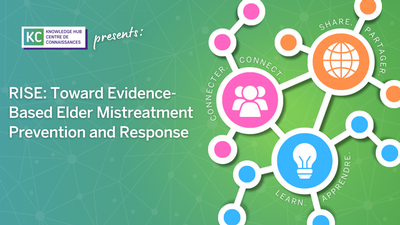RISE

Elder abuse is a widespread issue with severe consequences, including premature mortality, poor mental and physical health, and increased healthcare costs. Despite the severity of the problem, community-based responses to elder mistreatment have been lacking in Canada. Each year in Ontario, many older adults face various forms of abuse, often in silence and isolation (Lewis et al.,2024). Recognizing this pressing issue, a newly adapted initiative called RISE is being implemented and evaluated to address elder mistreatment through a community-based approach.
RISE, which stands for Relational, Individual, Social, and Environmental intervention, is a comprehensive program designed to address elder mistreatment through a community-based approach (Burnes et al., 2022). It was born out of a need to create a more robust system of response for older adults facing abuse and neglect. The program's journey began in two counties in Maine (USA), where it was piloted successfully, and has since expanded statewide.
The essence of RISE lies in its innovative integration of core modalities – motivational interviewing, restorative justice, teaming, and supportive decision-making. These techniques have shown promising results in fields of family violence and are now being adapted to tackle elder mistreatment. RISE works on multiple levels of ecological influence, focusing not only on the victims but also on the alleged harmers, their relationships, and the social supports surrounding them.
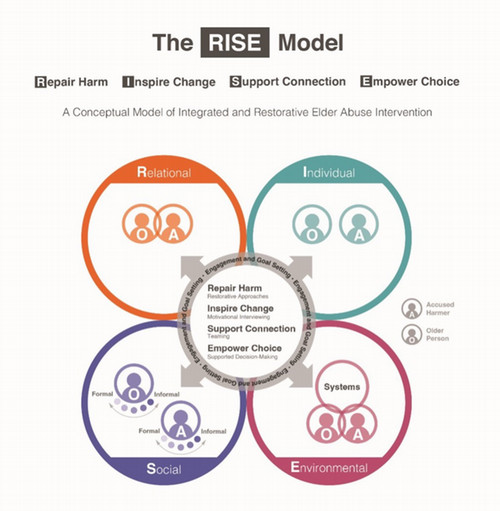
The RISE program is currently underway at the Factor-Inwentash Faculty of Social Work (FIFSW) in partnership with Elder Abuse Prevention Ontario (EAPO). The project seeks to create a province-wide system of community-based elder abuse response, serving older adults across Ontario who are at risk of or experiencing some form of elder abuse (MacNeil et al., 2022). Referrals come through the centralized EAPO telephone assistance line. All cases receive the standard EAPO consultation service, involving a 45 to 60-minute telephone consultation resulting in referrals to community services.
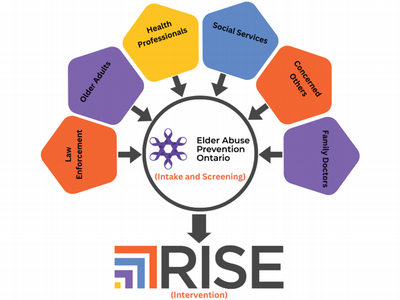
After receiving the EAPO consultation service, clients are screened for eligibility into the current project. Eligible cases are then randomly allocated into either the RISE intervention program (treatment group) specifically designed to work with and support elder abuse cases or remain with the current standard EAPO consultation (control) to pursue referrals on their own. This system of response serves older adults across Ontario, including both in-person and remote modes of service delivery depending on client location.
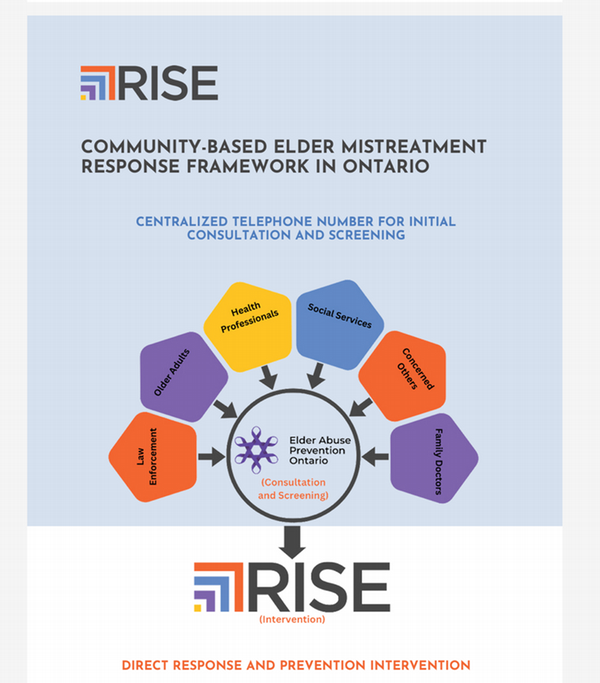
In February 2024, the Honourable Seamus O'Regan, federal Minister of Labour and Seniors, visited FIFSW to meet with the RISE team and announce the current Public Health Agency of Canada (PHAC) funding for RISE. This visit, accompanied by a press conference, provided unanticipated exposure for the RISE program, potentially elevating its reputation and increasing its potential to receive referrals.
The project team, driven by a passion for social justice and well-being, is committed to implementing and evaluating RISE in Ontario. They believe in the power of community and the importance of a relational approach to support older adults at risk of or experiencing mistreatment. By working closely with both victims and harmers, and by strengthening the social fabric around them, RISE seeks to create a safer and more supportive environment for older adults.
One example of RISE's impact involved a case of elder financial abuse where an older woman’s adult child sold her home without her knowledge or permission. With the support of a RISE advocate and coordination with other services, the team was able to prevent the home sale and retrieve the home for this older woman, highlighting the program's effectiveness in addressing urgent and complex cases.
As the project unfolds, the team remains hopeful that RISE will demonstrate the same levels of feasibility, acceptability, and improvement in case outcomes as it did in Maine. The goal is to establish a sustainable, evidence-based intervention that can be scaled across Canada, ensuring that every older adult has the support they need to live with dignity and respect.
References
Burnes, D., Connolly, MT., Salvo, E. Kimball, P., Rogers, G., & Lewis, S. (2022a). RISE: An integrated model of elder abuse intervention. The Gerontologist, 63, 966-973. Link: https://academic.oup.com/gerontologist/article/63/6/966/6608975?login=true
Lewis, S. Connolly, MT., Kimball, P., Salvo, E., Rogers, G., & Burnes, D. (2024). Self-neglect co-occurs with and is a risk factor for elder mistreatment: An analysis of Maine Adult Protective Services Administrative Data. Journal of American Geriatrics Society. Advance online publication. Link: https://europepmc.org/article/MED/38393747
MacNeil, A., Connolly, MT., Salvo, E. Kimball, P., Rogers, G., & Lewis, S., & Burnes, D. (2022). Preliminary findings on the use of “teaming” in elder abuse intervention: The RISE project. The Journal of Adult Protection, 25, 339-350. Link: https://www.emerald.com/insight/content/doi/10.1108/JAP-07-2023-0019/full/html?skip Tracking=true
Click here to Watch RISE's The Knowledge Hub Presents recording!
Community of Practice members:
David Burnes
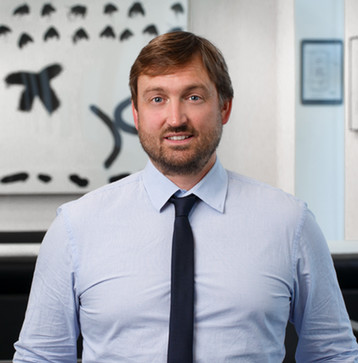
Dr. Burnes is a Professor at University of Toronto, Factor-Inwentash Faculty of Social Work. He holds a Canada Research Chair on Older Adult Mistreatment Prevention. He completed a PhD at Columbia University School of Social, concentrating in gerontology and advanced practice. Dr. Burnes’ program of research focuses on elder mistreatment (EM), including development of basic science (risk factors, prevalence, severity) and the design, evaluation, and measurement of interventions to prevent EM. He has advised major international organizations on EM, such as the World Health Organization and National Institutes of Health, as well as Canadian federal and provincial governments. Dr. Burnes has also advised non-profit organizations, such as state-level adult protective services programs, on the development and implementation of EM support programs. Dr. Burnes and colleagues developed “RISE”, a community-based EM response intervention currently used across the state of Maine and in initial stages of implementation and testing in Toronto.
Linkedin David: https://www.linkedin.com/in/david-burnes-5398a971/
Page Linkedin RISE COLLAB: https://www.linkedin.com/company/risecollaborative/posts/?feedView=all
Faculty Website: http://socialwork.utoronto.ca/profiles/david-burnes/
Publications: https://scholar.google.ca/citations?hl=en&user=NGAzETMAAAAJ&view_op=list_works&sortby=pubdate
Andria Allen
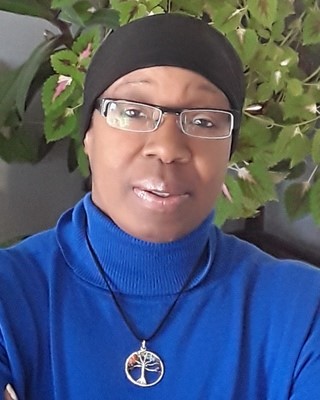
Andria Allen holds a Master of Social Work degree from the Factor-Inwentash Faculty of Social Work, University of Toronto. She is a clinical social worker and therapist and a registered social worker with the Ontario College of Social Workers and Social Service Workers. Her employment history includes the development and leadership of programs and services in the Greater Toronto Area.
Her career has focused on populations by stages of life intersecting with developmental disabilities, mental health, and various issues related to health equity. She offers years of experience with evidence-informed approaches to clinical service delivery and community development, intersecting with systemic oppression.
Andria led the development of programs and services, including population-specific programs for older adults from the diverse Caribbean and Muslim communities living in the west end of Toronto.
As the Supervisor for the RISE program, Andria is able to contextualize the realities of an older adult facing one or more of the different forms of elder abuse. The intersecting bio-psycho-social and cultural state of each individual impacted by abuse is a lived reality that too many older adults face.
